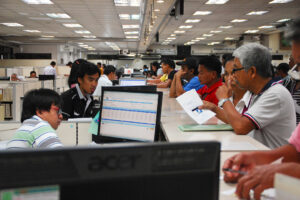The Konektadong Pinoy Act, or Senate Bill No. 2699, is a big leap forward in modernizing the Philippines’ digital infrastructure. Certified as urgent by President Ferdinand Marcos, Jr., passed on third reading and ratified by both chambers of Congress, this legislation seeks to boost competition in the data transmission sector, improve the ease of doing business for the entry of market players, and enhance cybersecurity standards for internet services in the country.
While the bill has met opposition — notably from the Philippine Chamber of Telecommunications Operators (PCTO) and Bantay Konsyumer, Kalsada, Kuryente (BK3) — the critiques often lack substantiated evidence. PCTO warns of cybersecurity risks, while BK3 suggests the bill may expose users to malicious actors. However, there has been no clear demonstration of how the current requirement of a Congressional franchise has improved cybersecurity, nor how increasing the number of players will compromise cybersecurity.
It is entirely reasonable for stakeholders to be vigilant about the implications of deregulation; national security and consumer protection are legitimate concerns. However, these must be weighed against empirical data and the structural integrity of the proposed reforms.
The Philippines is the only country requiring a legislative franchise for network providers — a requirement rooted in the analog landline era. Globally, licensing is managed by executive or regulatory agencies, enabling faster policy adaptation. Despite the franchise, the Philippines ranked third globally in web threats in 2024, underscoring its ineffectiveness in ensuring cybersecurity.
Countries such as the United States (via the Federal Communications Commission) and the United Kingdom (through Ofcom or the Office of Communications) manage network licensing and cybersecurity enforcement through agile, technically competent regulators. These models demonstrate how modern frameworks can help safeguard digital ecosystems more effectively.
Contrary to opposition claims, the Konektadong Pinoy bill establishes robust cybersecurity requirements. Section 9 mandates third-party cybersecurity certification aligned with ISO standards or others recognized by the Department of Information and Communications Technology (DICT). Moreover, the very capable men and women of the DICT and the National Telecommunications Commission (NTC) are empowered to audit providers and revoke authorizations when standards are unmet.
There will always be concerns but the key is recognizing these potential implementation issues to which the DICT is more than adept to develop detailed guidelines, capacity-building initiatives, and a registry of accredited auditors to ensure compliance, especially for smaller providers. These measures will then create a secure and inclusive internet environment without overburdening the industry participants.
Konektadong Pinoy complements existing legislation such as the Data Privacy Act, Cybercrime Prevention Act, and the proposed Cybersecurity Act. It reinforces a layered approach to internet security while enabling better and faster response to emerging threats and incidents. Furthermore, under the Foreign Investments Act, regulators retain authority to block untrustworthy foreign entities.
Removing the legislative franchise requirement reduces entry barriers for smaller and regional ISPs, catalyzing broader internet coverage — especially in rural and disadvantaged areas. This approach promotes both competition and equity, addressing long-standing disparities in digital access.
By shifting control to technical regulators and establishing dynamic security standards, Konektadong Pinoy bridges outdated policy with the demands of the digital age. As the bill integrates global best practices and strengthens local governance, it sets a foundation for resilient, secure, and inclusive digital growth.
The real threat to national security and economic progress lies not in liberalized access, but in maintaining rigid, outdated frameworks that hinder innovation and inclusivity. The Konektadong Pinoy bill offers a compelling alternative — one that empowers the Philippines to build a future-ready, cyber-secure digital nation.
Filipinos deserve better internet. Filipinos need Konektadong Pinoy. The fulfillment of Philippine digitalization now lies in the hands — and pen — of President Marcos.
Albert Dela Cruz is a veteran information security professional, and co-founder and director of the Philippine Computer Emergency Response Team Coordinating Center (PHCERT/CC).





